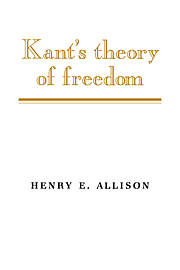Book contents
- Frontmatter
- Contents
- Acknowledgments
- Note on sources and key to abbreviations and translations
- Introduction
- Part I Freedom and rational agency in the Critique of Pure Reason
- Part II Moral agency and moral psychology
- 5 Rational agency and autonomy
- 6 Duty, inclination, and respect
- 7 Wille, Willkür, and Gesinnung
- 8 Radical evil
- 9 Virtue and holiness
- 10 The classical objections
- Part III The justification of morality and freedom
- Notes
- Bibliography
- Index
5 - Rational agency and autonomy
Published online by Cambridge University Press: 05 June 2012
- Frontmatter
- Contents
- Acknowledgments
- Note on sources and key to abbreviations and translations
- Introduction
- Part I Freedom and rational agency in the Critique of Pure Reason
- Part II Moral agency and moral psychology
- 5 Rational agency and autonomy
- 6 Duty, inclination, and respect
- 7 Wille, Willkür, and Gesinnung
- 8 Radical evil
- 9 Virtue and holiness
- 10 The classical objections
- Part III The justification of morality and freedom
- Notes
- Bibliography
- Index
Summary
The concern of the first part of this study was chiefly with Kant's first Critique conception of rational agency. We saw that according to this conception, rational agents are free in the practical sense, with such freedom being understood negatively as an independence from pathological necessitation and positively as a capacity to act on the basis of imperatives (which includes, but is not limited to, the categorical imperative). We also saw that this must be understood as an incompatibilist form of freedom, even though Kant sometimes distinguishes it from the transcendental variety. Finally, we saw that “mere practical freedom” is all that Kant thought was required for morality circa 1781, because he had not yet arrived at the conception of the autonomy of the will.
The concern of the second part is with the account of moral agency, including the moral psychology, which Kant developed in light of the conception of autonomy in his writings on moral philosophy from the Groundwork on. The present chapter is intended to serve as a bridge between the two parts and as the first step in the analysis of Kant's “fully critical” views on moral agency. Although its main focus is on the conception of autonomy, it approaches its target somewhat obliquely by considering this conception in light of the analysis of rational agency in Groundwork II.
- Type
- Chapter
- Information
- Kant's Theory of Freedom , pp. 85 - 106Publisher: Cambridge University PressPrint publication year: 1990
- 1
- Cited by



